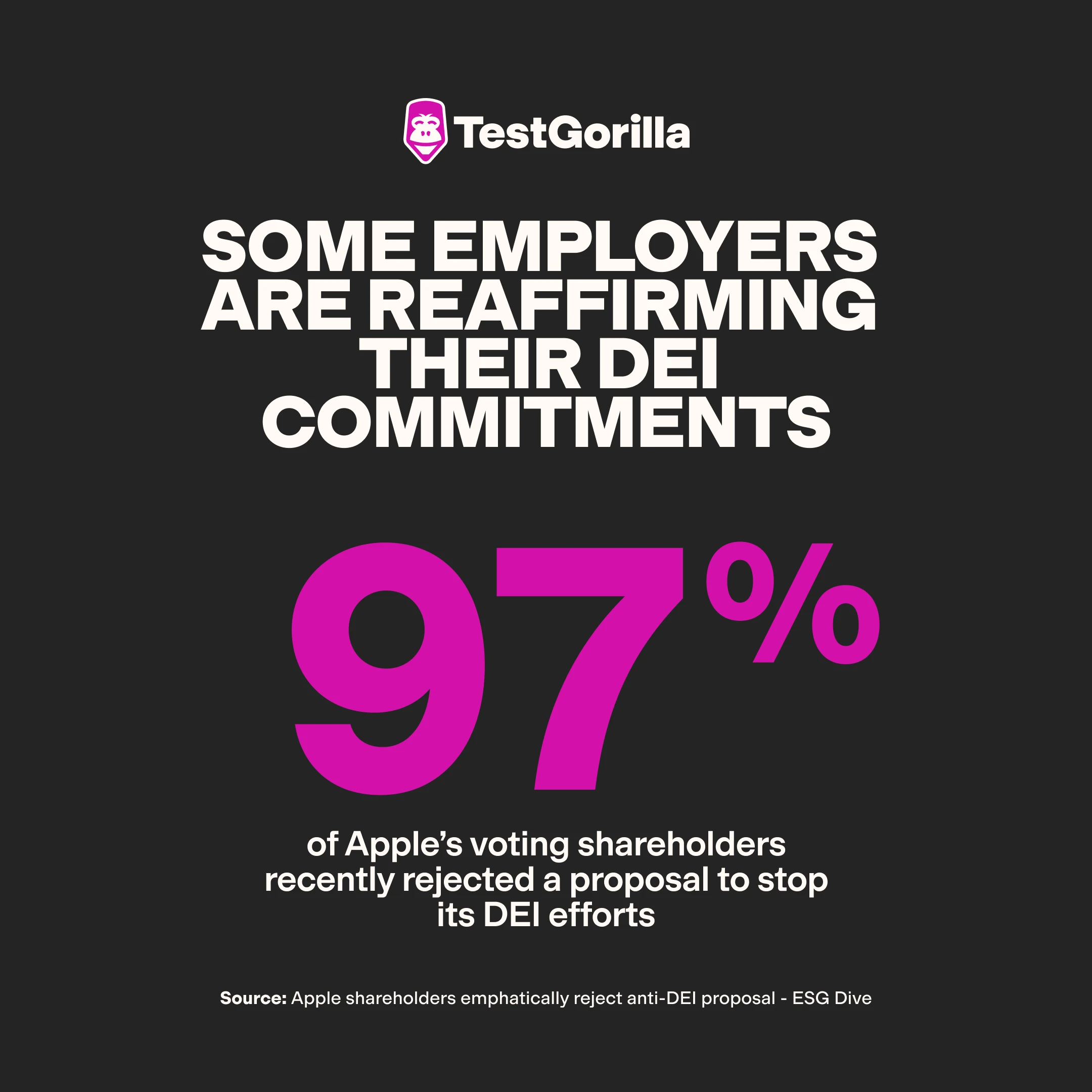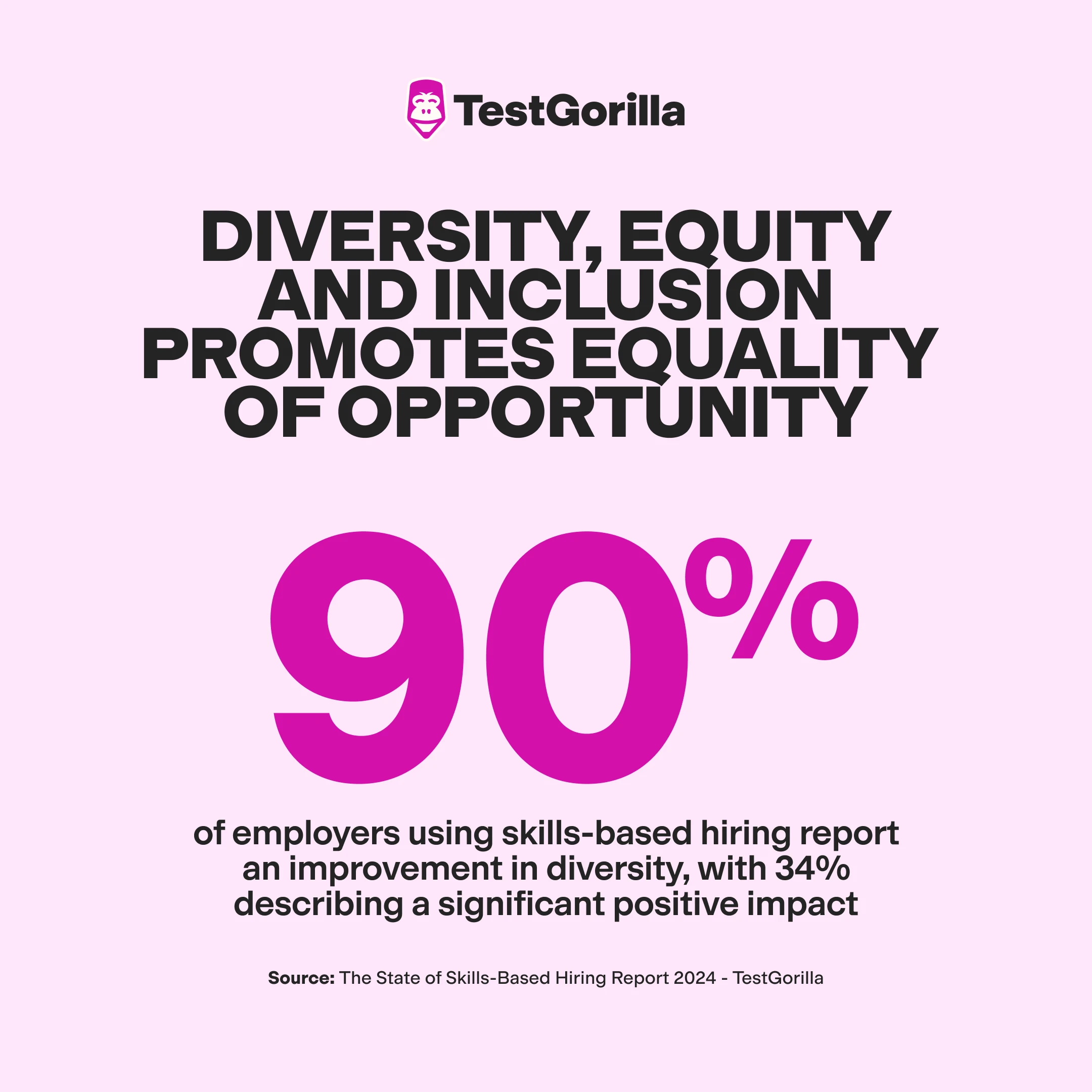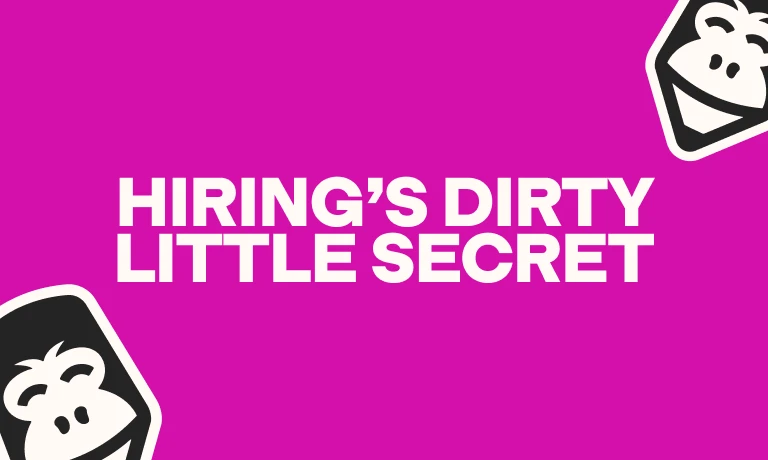DEI is under threat, but most employers are staying committed (& how you can do the same)
Since the start of the year, there have been massive political, legal, and cultural shifts against diversity, equity, and inclusion (DEI) in the workplace. This has led to several high-profile companies walking back on their previous commitments in very public ways.
However, while DEI may be under fire, TestGorilla research suggests that most employers haven’t abandoned it.
In this article, I examine why this is the case and present the argument for skills-based hiring as a practical, apolitical, and effective strategy for supporting workplace diversity and inclusion, particularly when DEI initiatives are under broader threat.
The context of the current DEI rollbacks
Brief history of DEI
In the US context, the concept of diversity, equity, and inclusion began to evolve in the 1960s, following the introduction of laws such as the Civil Rights Act, which prohibited employment discrimination.
Since then, there’s been a growing – but nonlinear – shift toward supporting DEI in the workplace. Recently, this has been evident in various executive orders, memoranda, and measures implemented by the Obama and Biden administrations.
For example, under Executive Order 14020, President Biden established the White House Gender Policy Council “to advance equal rights and opportunities, regardless of gender or gender identity, in advancing domestic and foreign policy.”
In 2020, there was a sharp uptake in private employer commitments to DEI following the murder of George Floyd. Some of these commitments were (rightfully so) criticized as performative or examples of diversity washing – public statements aimed at boosting an organization’s image, without any meaningful action to create a real change.
Some employers were also unsettled by a 2023 US Supreme Court ruling that struck down race-based affirmative action in college admission decisions. While the specific law on which the decision was based doesn’t apply to private employers, the case raised questions about future implications for workplace DEI initiatives, including the use of quotas.
On the whole, however, between the 1960s and early 2020s, we saw a steady rise in employer commitments to DEI principles.
Second Trump administration
But everything changed with the second Trump administration.
Within days of resuming office in January 2025, President Trump issued a series of executive orders aimed at dismantling the DEI framework in the US:
Executive Order 14151 terminated DEI “mandates, polices, programs, preferences and activities in the Federal Government.”
Executive Order 14168 confirmed the US government only recognizes two unchangeable sexes, male and female, and banned the use of “gender identity” or promotion of so-called “gender ideology” by federal government agencies.
Executive Order 14173, titled “Ending Illegal Discrimination and Restoring Merit-Based Opportunity,” further dismantled DEI practices by federal agencies and encouraged “the private sector to end illegal DEI discrimination and preferences.” To do this, the Attorney General was tasked with investigating and reporting on “the most egregious and discriminatory DEI practices in each sector of concern” and “identify[ing] up to nine potential civil compliance investigations” of certain types of private sector organizations, associations, and higher education institutions.
Following these executive orders, the Attorney General issued a memorandum tasking the Civil Rights Division to “investigate, eliminate, and penalize illegal DEI and DEIA [diversity, equity, inclusion, and accessibility] preferences, mandates, policies, programs, and activities in the private sector and in educational institutions that receive federal funds.”
President Trump also appointed a new acting chair to the Equal Employment Opportunity Commission, Andrea R. Lucas, who confirmed her commitment to supporting the administration’s position on DEI. Following her appointment, Commissioner Lucas said:
“Consistent with the President’s Executive Orders and priorities, my priorities will include rooting out unlawful DEI-motivated race and sex discrimination; protecting American workers from anti-American national origin discrimination; defending the biological and binary reality of sex and related rights, including women’s rights to single‑sex spaces at work; protecting workers from religious bias and harassment, including antisemitism; and remedying other areas of recent under-enforcement.”
How have employers responded?
The rapidly changing landscape of DEI in the US has, understandably, shaken many employers, prompting a mixed response.
Some larger US corporations have been quick to toe the line:
Meta announced to staff it would scrap many of its DEI initiatives, including its supplier diversity policy and DEI team, stating that “the term ‘DEI’ has become charged.”
Amazon told employees it would be “winding down” specific DEI programs and removed any references to the term from its 2024 annual report.
Target rolled back its DEI programs and ended DEI goals, sparking a backlash from consumers who have boycotted the store.
In my opinion, these reactive and short-term strategies only undermine these companies’ employer brand and brand image.
In contrast, other employers have bravely seized the opportunity to reaffirm their DEI commitments, with several large companies leading the way:
On the advice of Apple’s leadership, 97% of Apple’s voting shareholders recently rejected a proposal to stop its DEI efforts.
Similarly, Delta Air Lines ' Chief of External Affairs Officer, Peter Carter, recently said, “We are steadfast in our [DEI] commitments because we think that they are actually critical to our business. DEI is about talent, and that’s been our focus.”
For most employers outside of the US, it’s business as usual. A recent poll by the Institute of Directors found that 71% of UK businesses don’t intend to change their approach to DEI in light of recent developments in the US.
In saying that, some foreign companies that work with the US have felt pressured to change their approach. For example, Accenture, which has its headquarters in Ireland and contracts with the US government, ditched its global diversity and inclusion goals in light of “the evolving landscape in the United States, including recent executive orders with which we must comply.”
→ Read more of my thoughts on the scaling back of DEI in the US and its unintended consequences for businesses. |
What TestGorilla’s research reveals about employers’ true priorities
In this context, it’s important to understand what employers really value and how they can continue to support equity in the workplace despite these changes.
Through research for our 2025 State of Skills-Based Hiring Report, we learned that 79% percent of employers believe having a more diverse team is important to their business, while 84% say building an inclusive company culture is essential.
In other words, most employers continue to prioritize diversity and inclusion, despite the current climate.
And that’s wise – not only because prioritizing DEI is a moral and social imperative but also because the business benefits of diversity and inclusion in the workplace are well established:
Improved creativity and innovation. Per a Forbes Insights survey, 85% of executives agreed that a diverse and inclusive workplace is essential for fostering different perspectives and ideas that drive innovation.
Better productivity and performance. McKinsey research found that companies with ethnically and culturally diverse executive teams outperformed others by 36% in profitability. Similarly, those with gender-diverse executive teams were 25% more likely to achieve above-average profitability than others with less diversity.
Enhanced employer branding. Candidates look for companies that prioritize diversity and inclusion. According to an Eagle Hill Consulting survey, 53% of US workers cite DEI as a key factor when evaluating an employer, with this increasing to 77% for Gen Z and 63% for Millennials.
But there’s more
What’s especially interesting about our findings is that there’s a difference in attitudes between employers who use skills-based hiring and those who don’t.
83% of employers who use skills-based hiring say a diverse team is important, while only 58% of employers who don’t use skills-based hiring agree.
87% of employers who hire for skills say building an inclusive culture is important to their company, compared to 70% of employers who don’t.
In my opinion, this gap highlights an important point: Employers who use skills-based hiring tend to instill inclusivity in their culture. Rather than performative actions, they focus on tangible outcomes. Rather than simply saying DEI matters, they’re adopting hiring practices that genuinely support diversity and inclusion in the workplace.
I think this also highlights the importance of skills-based hiring as a tool for supporting DEI. Why? Because prioritizing skills promotes fair hiring and equal access to opportunity for all.
The best insights on HR and recruitment, delivered to your inbox.
Biweekly updates. No spam. Unsubscribe any time.
Why skills-based hiring is a tool for structural equity
It promotes equality of opportunity
Skills-based hiring levels the playing field for candidates by focusing on their abilities above all else.
This means people from diverse backgrounds can compete fairly for open roles: Their suitability for a role is judged based on measurable, objective criteria related to their skills.
While this is especially true for historically underrepresented or marginalized groups, it benefits everyone. Skills-based hiring enables employers to build a workforce that naturally mirrors the diversity of the community in which their business operates, without relying on measures that may be considered more controversial in the current climate, such as diversity targets.
Our research confirms this. For our 2024 State of Skills-Based Hiring Report, we found that 90% of employers using skills-based hiring report an improvement in diversity, with 34% describing a significant positive impact.
It removes traditional barriers to entry
Reliance on previous job titles, degrees, and professional networks can act as a barrier to employment for many candidates, especially those from marginalized groups.
A skills-based approach to hiring encourages employers to move away from requiring formal qualifications that might exclude otherwise suitable candidates. It recognizes that candidates can develop skills outside of traditional educational pathways, such as through on-the-job learning.
Governors in several states, including California, Ohio, and Virginia, have removed these requirements from state government jobs, and many employers in the private sector have followed suit. According ResumeTemplate, 25% of companies have eliminated or plan to eliminate these requirements by the end of 2025.
Removing potential barriers to employment offers huge benefits to employers. It widens talent pools, giving them access to hidden and overlooked talent such as:
Workers without formal qualifications who are skilled through alternative routes (STARs).
Candidates with highly transferable skills, such as veterans transitioning to the private sector, who lack direct corporate experience. While their resume doesn’t reflect a traditional corporate career, skills testing during the hiring process would help reveal their transferable soft skills, including leadership, communication, and decision-making.
Fair chance workers (people with criminal records).
Caretakers, often women, returning to the workforce after time off to raise a family. These candidates may lack recent references, but assigning them a short task during the hiring process, for example, allows them to demonstrate their time management and organizational skills.
Individuals with disabilities, who may not have been able to complete formal studies.
More accessible employment for candidates and wider talent pools for employers? Skills-based hiring is a win-win.
It reduces the risk of unconscious bias
Hiring decisions involve humans and, as a result, are often influenced by unconscious or implicit bias. Diversity advocate Vernã Myers describes these biases as “the stories we make up about people before we know who they actually are.”
This means that subjective factors – such as race, gender, or even the institution a candidate attended – can affect their recruitment chances, for better or worse. For example, in a ResumeBuilder survey of 800 US hiring managers, 38% reported that they have unconsciously judged a candidate’s resume based on their age.
When bias affects the hiring process, diversity and inclusion suffer as well.
Skills-based hiring practices – such as skills testing, structured interviews, and blind recruiting – provide neutral and objective insights into candidates’ abilities. With this information, employers can compare candidates fairly, making hiring decisions less likely to be influenced by bias.
Most employees already understand this. In our 2024 State of Skills-Based Hiring Report, 84% of employees agreed that skills-based hiring helps reduce conscious and unconscious hiring bias.
Fair hiring doesn’t have to be political
I understand that some employers, especially those in the US, face challenges navigating how to support workplace DEI given the current context. Employers should always comply with the laws that apply to them, including those that might, unfortunately, restrict certain DEI practices.
But I believe even in this climate, employers can and should do everything they can to support DEI in fundamental, tangible ways.
Critics argue that DEI policies and practices unfairly advantage certain candidates or employees, rather than supporting hiring based on merit. I strongly disagree – this misses the point entirely.
DEI is and has always been about ensuring everyone has equal access to opportunities. While it acknowledges the impact of historic inequities and unconscious bias, it doesn’t suggest that one person’s progress has to come at the expense of another’s.
That’s why I believe that skills-based hiring remains one of the most valuable tools for promoting hiring equity. As I’ve already explored, it creates a level playing field, removes potential barriers to entry, and reduces the risk of unconscious bias from hiring decisions for all candidates.
This makes skills-based hiring a practical and apolitical strategy for advancing workplace equity – one that doesn’t depend on the external political or cultural climate. Writing for Forbes, Laura Guillén, Associate Professor and Director of the Leadership Development Research Centre at Esade, echoes this view:
“Rather than treating DEI as a separate initiative, organizations should integrate it into their mission statements, leadership development programs, and business strategies. By making DEI a fundamental part of corporate identity, organizations can sustain their efforts even when external pressures shift.”
In other words, building equity into how your organization hires makes it more resilient, and skills-based hiring is a great strategy to achieve this.
Skills-based hiring as a path forward for inclusive hiring
Despite the shifting landscape and subsequent DEI rollbacks, it’s important not to lose sight of the fact that many employers continue to prioritize diversity and inclusion.
In this context, skills-based hiring offers a robust, non-partisan way forward. It honors hiring based on merit and creates equal access to opportunities for all. It’s more than just a recruitment method – it’s a strategic way to build a fairer future of work.
Disclaimer
The information in this article is a general summary for informational purposes and is not intended to be legal advice. DEI laws in the US are currently subject to constant change, and their application varies based on your individual circumstances. You should always seek legal advice from a qualified attorney about your legal obligations as an employer, especially in the current climate. While this summary is intended to be informative, we cannot guarantee its accuracy or applicability to your situation and cannot be held liable for any decisions made due to it.
You've scrolled this far
Why not try TestGorilla for free, and see what happens when you put skills first.




















